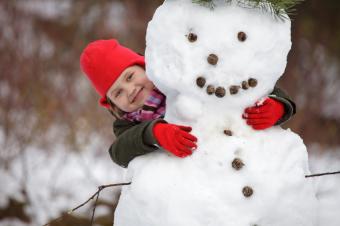French Weather Vocabulary

If you are traveling to France, undoubtedly you'll want to brush up on your French weather vocabulary. How else will you know whether or not to grab your parapluie (umbrella), or your lunettes de soleil (sunglasses). You might listen to la météo (the weatherman) or read les prévisions (the forecast) to get a better idea of what the day holds in store.
Tip for Americans: Remember that la température is in Celsius and not Farenheit!
Quel temps fait il?

In French, asking and talking about the weather requires the verb faire. If you want to ask about the weather you say, Quel temps fait-il?. To answer that question you generally say, il fait. . .
- beau (nice or beautiful)
- chaud (hot)
- froid (cold)
- nageux (cloudy)
Note: Rain, snow and other weather events have their own verbs and don't require faire.
Il fait orageux. (It's stormy.)

If you see dark nuages (clouds), chances are good that you are in for un orage (thunderstorm). Other words you might see that go along with a thunderstorm:
- la foudre (lightening)
- la tonnere (thunder)
- la pluie (rain)
- Il pleut! (it's raining)
- un arc-du-ciel (a rainbow)
- pleut à verse (pouring)
La neige

Everyone loves it when il neige (it snows). Maybe you can go outside and build un bonhomme de neige (a snowman). However, if there is a lot of glace (ice), you might want to stay indoors and enjoy some hot cocoa! If you want to be well prepared, listen for the following words during the forecast:
- la précipitation (precipitation)
- l'hiver (winter)
- tempête de neige (blizzard)
Il fait du vent

Il fait du vent or "it's windy," is something you'll hear frequently in the forecast--particularly if you are seaside. A few more words that describe various states of wind include:
- une tornade (tornado)
- un ouragan (hurricane)
- un grand vent (gale)
Le printemps

You know that it's spring when the tulips are in bloom and your allergies start acting up. Check the forecast for words like le pollen, or taux de pollen to find out whether or not you are going to have issues with the pollen. You'll also want to watch out for une brise (a breezy), or weather that is especially venteux (windy). Spring breezes are nice but sure can wreak havoc with seasonal allergies.
Sign up for our newsletter featuring all the latest stories and products we love.
Learn French Weather Phrases!

Consider weather expressions using the verb faire to be part of your everyday phrases. You can practice them using flashcards, or better yet, tune into a forecast and see how much you can understand. The more French weather vocabulary you know, the more prepared you'll be!







